How a Chinese-only life sim climbed the Steam charts by channeling the stress of childhood
Chinese Parents is a poignant, stressful game about, well, growing up with Chinese parents.
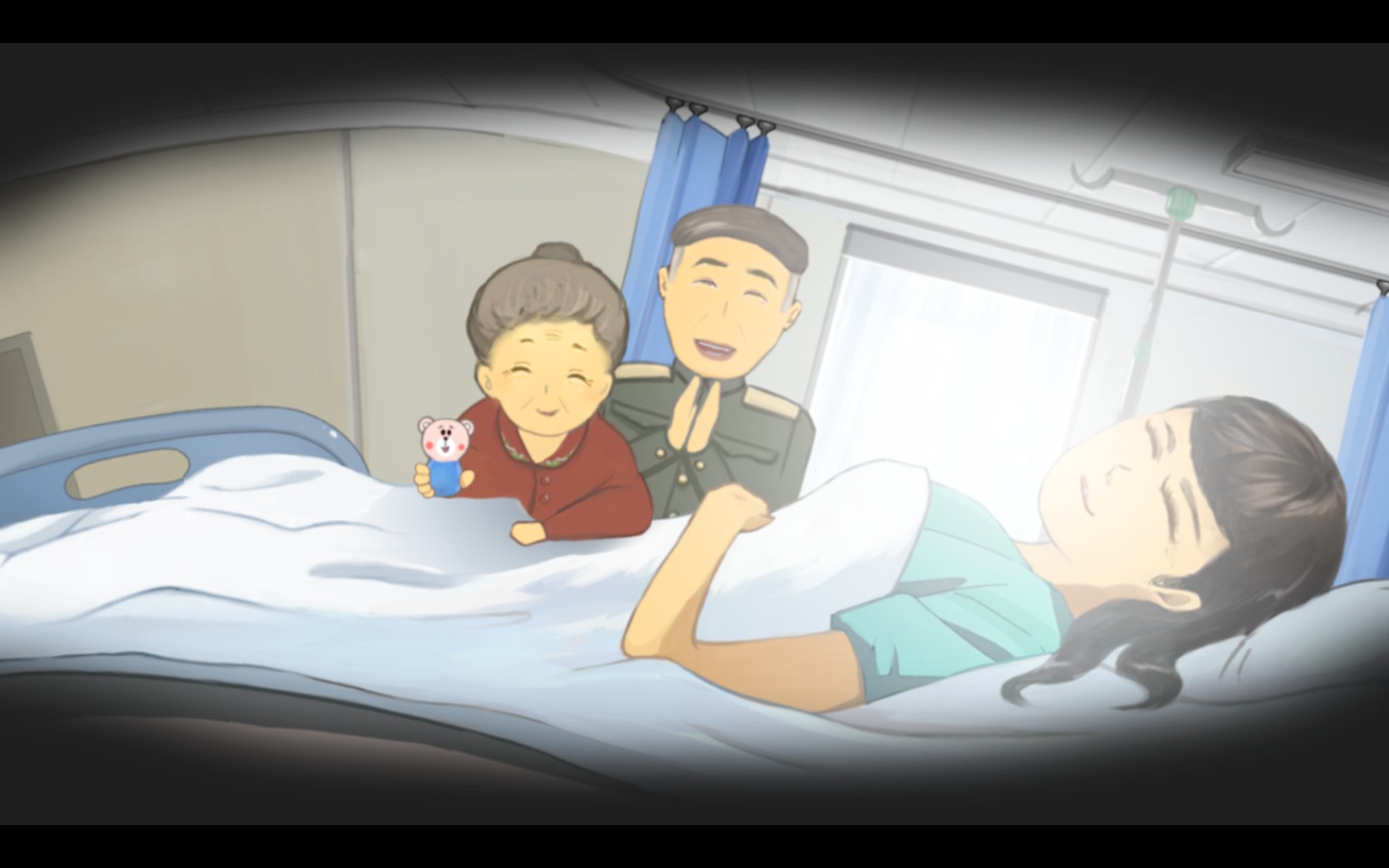
One of the most prevalent stereotypes of Chinese parenting is the “tiger mom:”a high-intensity, authoritarian approach to parenting that, as I can attest, is a pretty common facet of growing up in a Chinese household. Academic excellence is a matter of dire importance. Leisure activities are regarded as frivolous affairs, often disapproved of in favor of loftier pursuits like supplementary classes. Gaming with Dad or Mum? Catching a movie together? Heading out for a family picnic? These hardly happen, really.
In Chinese Parents, you aren’t the Pokémon trainer in control of your little critters; you are the Pokémon.
So I felt a tinge of bittersweet nostalgia when I played Chinese Parents, a game about the joys and perils of growing up as a Chinese kid. Since September 29, Chinese Parents, developed by Beijing indie developer Octopus Games, has racked up thousands of positive reviews and even spent a few weeks on Steam's most-played chart. It peaked at 32,593 concurrent players according to SteamDB, for a time putting it ahead of games like Fallout 4 and Civ 5. That's impressive for any game, but especially so for one that's only playable in Simplified Chinese, which millions of Steam users can't read.
Chinese Parents shows just how much Steam's audience has grown in China; today nearly a quarter of Steam players are using the platform in Simplified Chinese. But more importantly, it's a wildly enjoyable and relatable game that offers an achingly familiar experience for those who had to endure the stresses of steep parental expectations.
The stresses of childhood
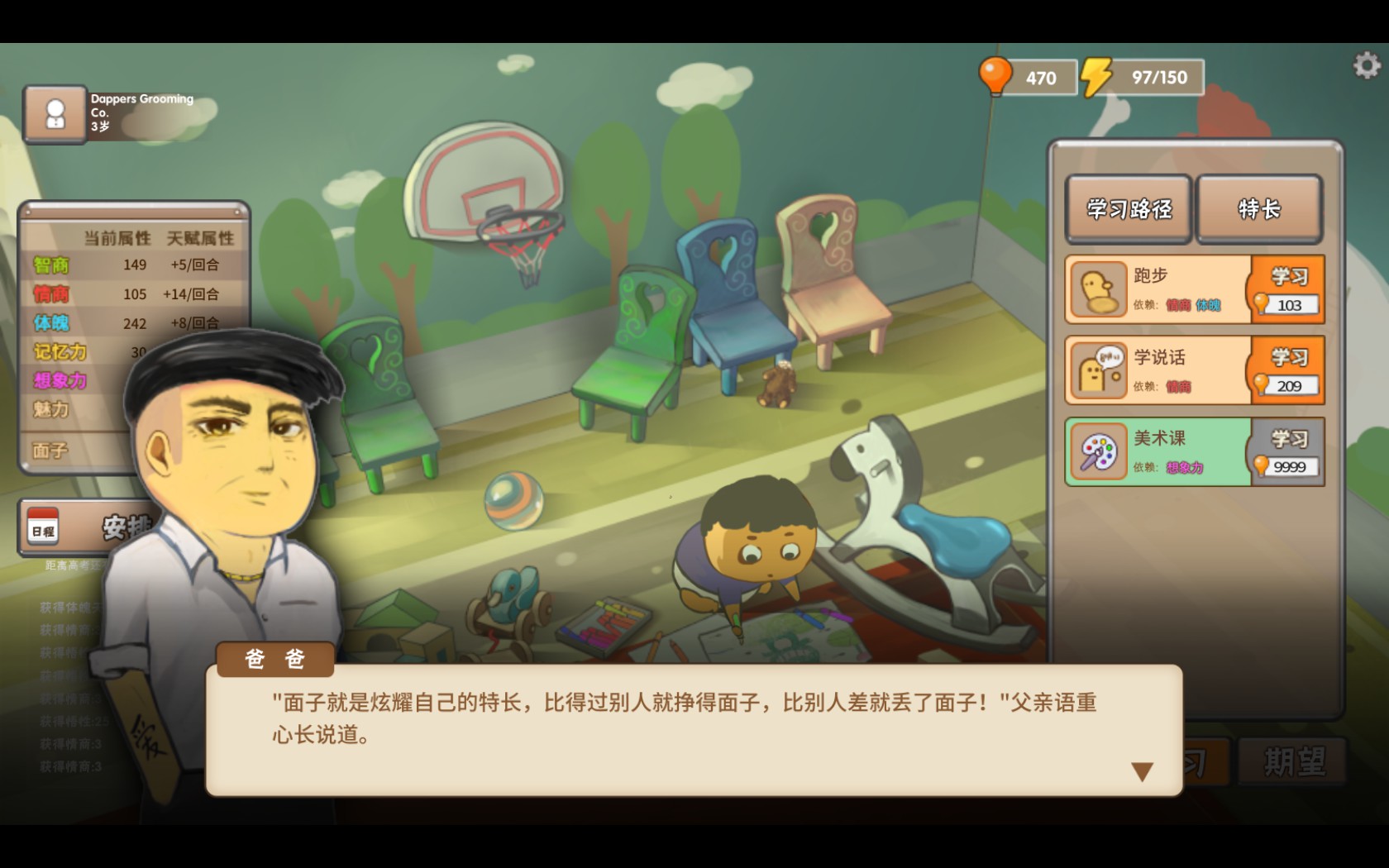
Dealing with such anxiety isn’t just for adolescents only, of course—and that’s why Chinese Parents has you begin the game as a literal baby, much like the opening scene of Fallout 3 where you're born to a dingy hospital room. Popping out of your mother’s womb as a wee tot in much more sanitary surroundings, Chinese Parents is immediately heartwarming. The first thing you see is your family beaming at you, the morning sunlight streaming through the window as its brilliance slightly blurs your vision. Then you spot your dad looking back at you with pride, his eyes brimming with joyful tears.
But that sentimentality only lasts for a moment, quickly giving way to the first goal you’ll face as a Chinese toddler: being a healthy baby boy. This is the first of many, many parental expectations you’ll encounter all the way till adulthood. On a mechanical level, fulfilling these goals means raising your stats—such as intelligence, sensitivity, endurance, memory, creativity, and charisma. So as a fresh new baby, accomplishing that goal means having to meet a minimum endurance requirement. Stats are color-coded, and raising this figure is about collecting as many gems of that particular color as possible in a mini game.
The crux of Chinese Parents is about prioritizing which stat to increase. Complicating matters is how you’ll also need to pick up certain baby maneuvers, like mustering the motor skills and strength to lift your head, or learning how to flip over from your back to your tummy. These, too, are dependent on the strength of your stats. Sounds simple enough, right?
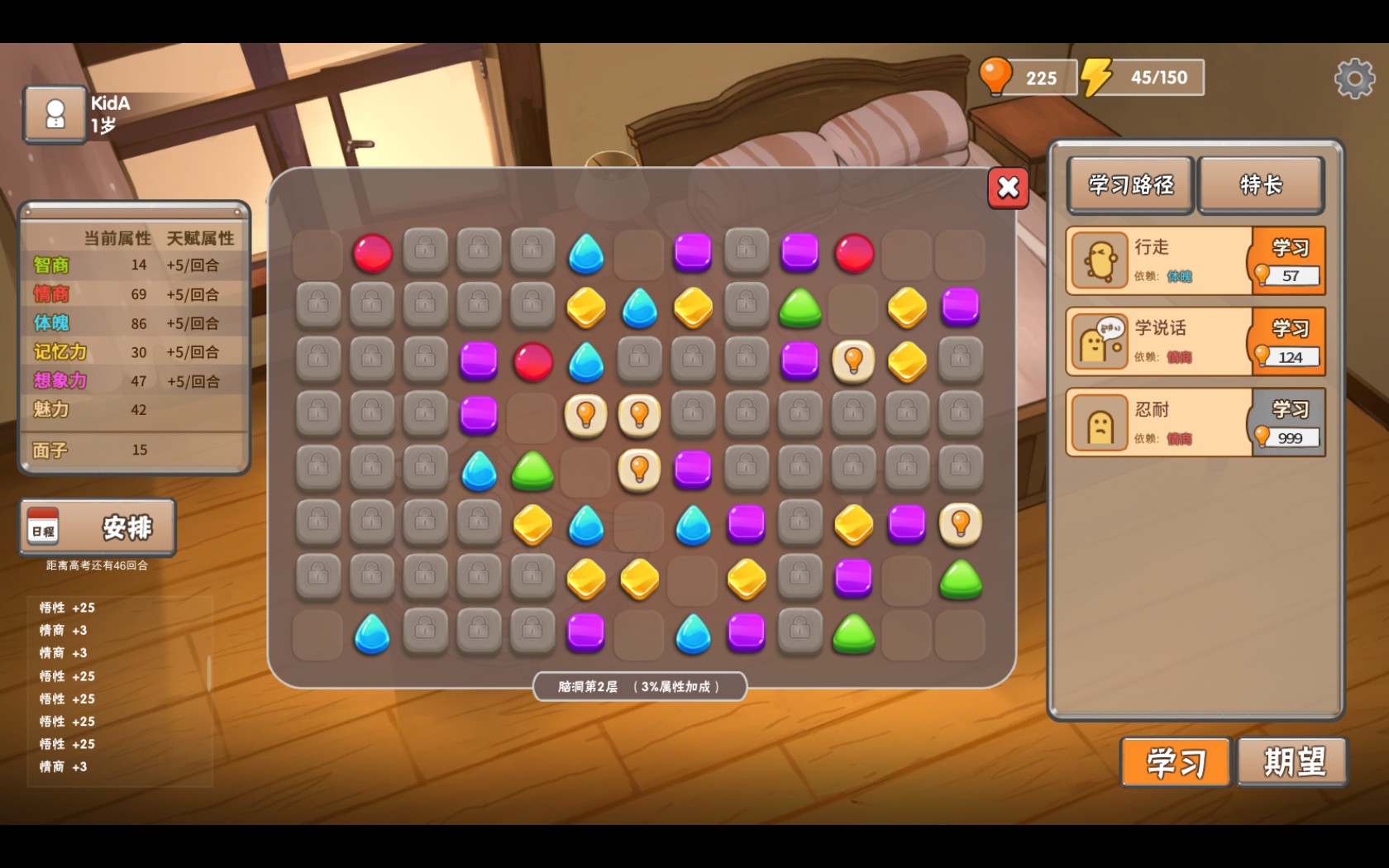
Only it isn’t. Knowing how to perform these parlor tricks isn’t enough. You need to be so damn good at them that your parents can brag about your talents. This will eventually culminate in a snappy, one-on-one showdown between your parents and your nosy and competitive relatives, in which you’ll have to pit your skills against your cousins’ acrobatic performances. Which one of you can flip their pint-sized body hard enough to perform somersaults at the tender age of five? And oh boy, there's whole library of skills and knowledge you’ll need to master as you grow older, from swimming like Poseidon to becoming the next Einstein.
Keep up to date with the most important stories and the best deals, as picked by the PC Gamer team.
In Chinese Parents, you aren’t the Pokémon trainer in control of your little critters; you are the Pokémon, speeding through rounds of rigorous training at the hands of your parents. The stakes are high, and the pressure of keeping up with these expectations is so intense that it does reach a boiling point. You can even suffer from a psychotic break. Factoring in time for leisure activities is a must, like taking a walk at the park with your grandparents, or learning how to clap along to traditional Chinese music.
But doing these too often will also earn the ire of your parents, who will tell you off for being a bum. Think of it as a more macabre version of the sanity meter prevalent in survival horror.
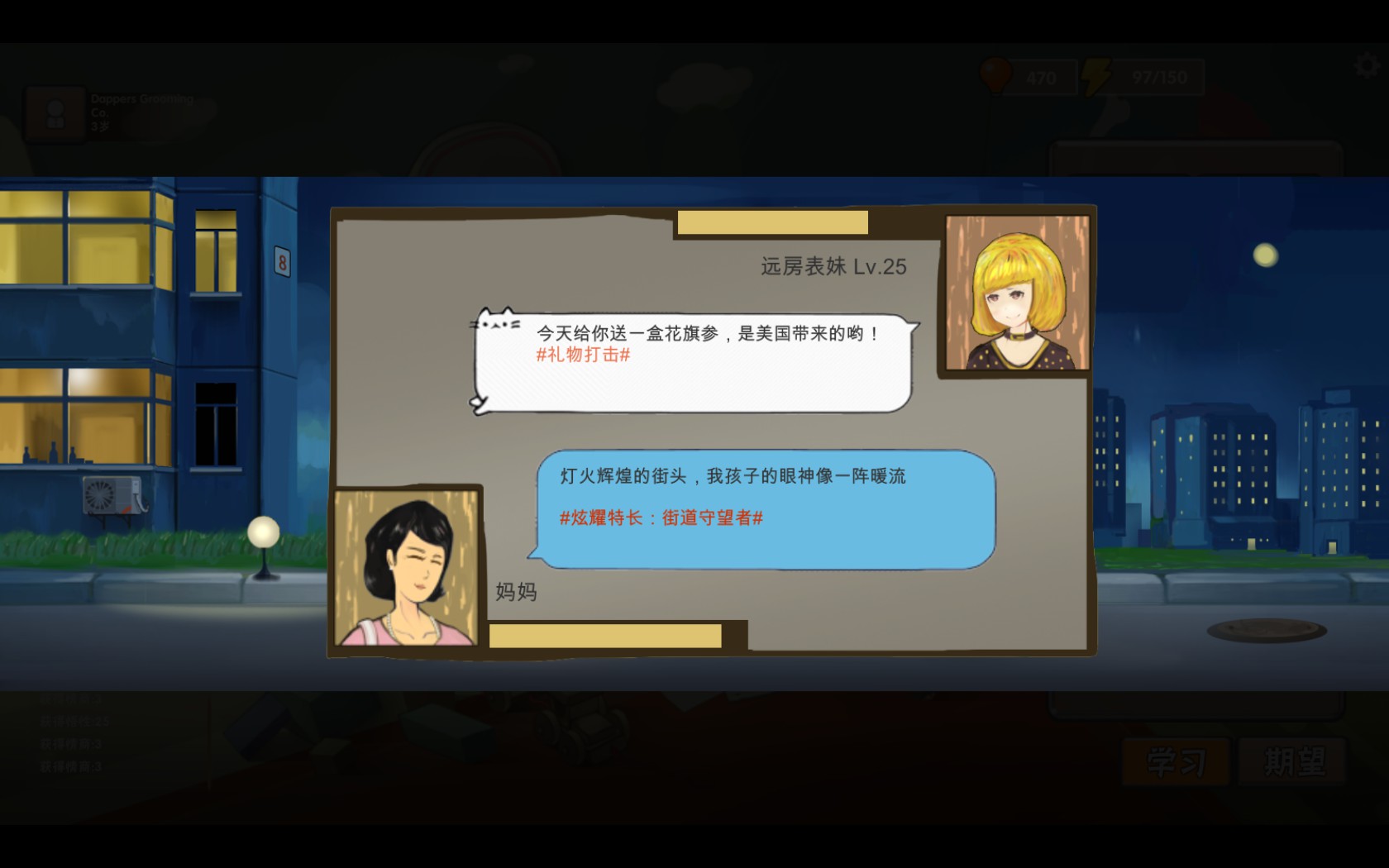
Pleasing your parents
At heart Chinese Parents is a brutal game of resource management, which does mirror the childhood anxiety I struggled with with to an extent.
Beneath these systems is a bigger cultural concept at play. It’s called "face," and in Chinese Parents, it’s the key ingredient to truly becoming the outstanding young man your parents want you to be. In broad terms, Chinese Parents is about making sure your parents don’t lose face—bolstering their self-image so that they can look better in front of peers and relatives. In real life, this means that children are often faced with pressure to become both well-adjusted and exceptional. Not only do they need to excel academically, they also have to be respectful, courteous, and demonstrate exceedingly good manners.
One distinct example in Chinese Parents is a short segment on accepting red packets, monetary gifts offered by elders during birthdays and special occasions. In this scenario, you need a marker to stay within a portion of a bar that appears at the bottom of the screen. This is primarily about performativity, because you can’t appear too eager to accept the gift. On the other hand, being forthright about rejecting the gift will cause your aunt—and by extension, your own parents—to lose face.
Face is its own stat, and allows your character to perform bigger, more impressive feats during showdowns with other relatives. The higher your face, the more skills you can invest in. Oh, and the parental expectations I mentioned earlier? They tie in with these battles too. Winning them is imperative to making it through the game, all the way till university.
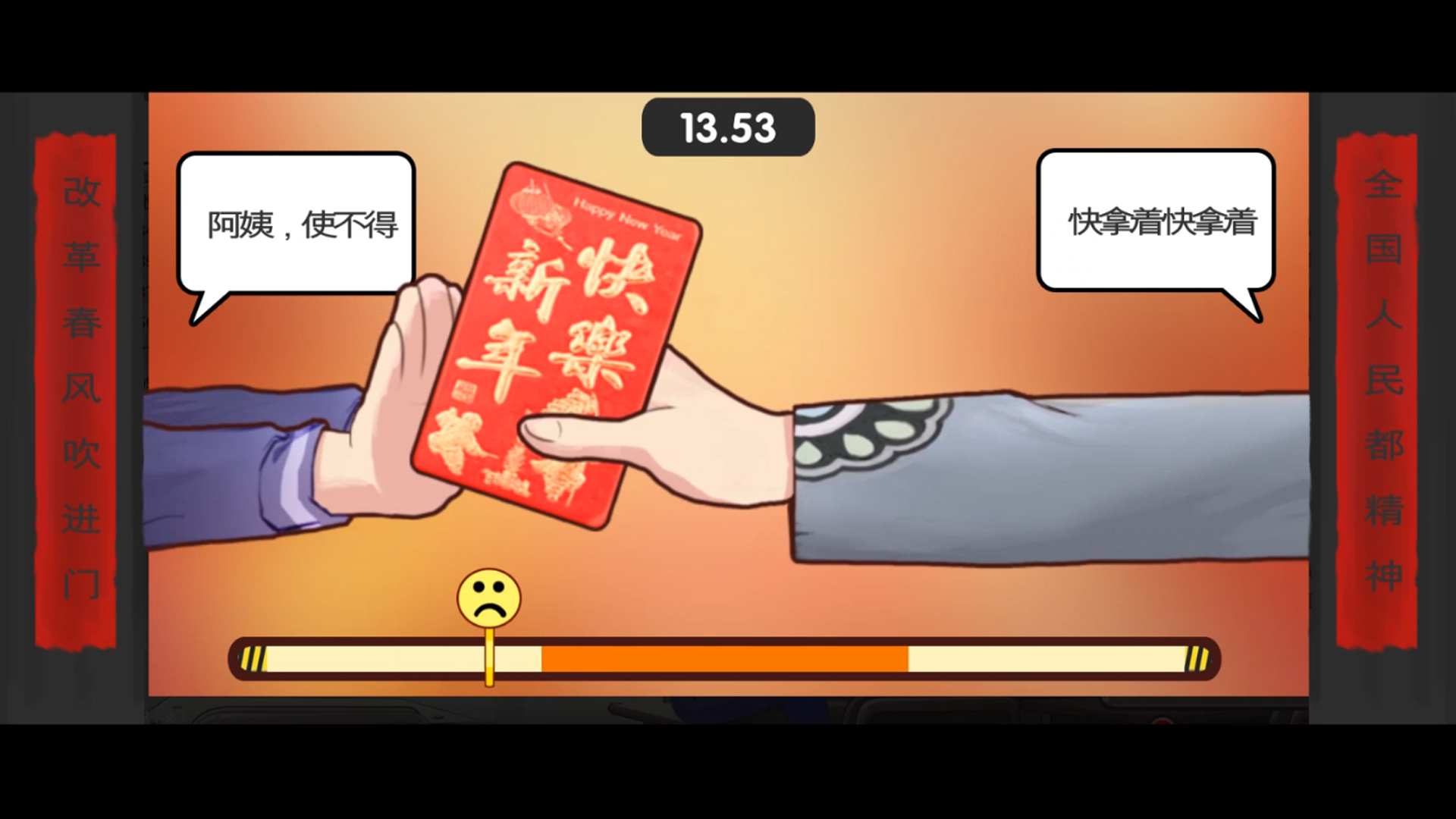
Yet these mechanics are mere scratches on the surface of Chinese Parents, which demands more as the boy grows older and keeps repetition from growing stale. The gems mini-game is expanded. Each stage is densely packed with more stones you’ll have to excavate, but with the constraint of limited moves. As in life, graduating from elementary school to middle school means being exposed to a even wider range of subjects—including literature and classical studies. Yet you’ll still only have 24 hours in a day to cram all this knowledge into your noggin.
As you grow, Chinese Parents layers on even more meters to ramp up the anxiety. On top of one that depicts your parents’ fluctuating satisfaction with your grades, there’s another that charts your personality type, which is partly determined by your daily activities. Study too hard with no leisure hours, for example, and you may eventually become a psychopath. Then there’s managing your hard-earned pocket money, which you can use to give your stats a boost like buying a self-help book, or alleviate your stress by splurging on candies and toys.
At heart, Chinese Parents is a brutal game of resource management, which does mirror the childhood anxiety I struggled with with to an extent. Of course, as a child back then, I wasn’t imbued with the same degree of self-discipline and ruthless efficiency I was inflicting on this poor boy, but Chinese Parents does still manage to capture the fear of incurring my parents’ displeasure.
Despite how intense it all sounds, childhood in Chinese Parents isn’t just a boundless sea of angst and anxiety. Octopus Play manages to balance the emotional weight with lighthearted moments through bite-sized anecdotes about growing up as a starry-eyed child, fascinated by the happenings around us.
Remember the twisted feeling in your chest when you greeted your teacher in kindergarten, only to realize she wasn’t paying attention to you at all? Or the tiny crush you had on a classmate who was too cool and aloof to hang out with the other kids? Occasionally, there’s even a poll asking if you’ve been through the same scenarios before, and that’s where you can see how many players feel the same way. It’s a pleasant touch for a game that, if handled more thoughtlessly, could spiral into heavy-handed moralizing about childhood in Chinese families.
Juggling the various responsibilities expected of a Chinese kid can be a tense experience in Chinese Parents. I soon found myself struggling to make him grow up as efficiently as possible so that he got as much out of every activity as he could. Unlike most games, this doesn’t get easier the more experience you gather; every year introduces brand new expectations and goals to fulfill. Yet Chinese Parents is ultimately a reminder to slow down amidst all that bustle. The weight of these expectations never goes away, but it’s up to us to decide when to start living for ourselves. It's a much-needed reminder that constantly striving to live up to anyone’s expectations, even your parents’, will only prove to be an endless struggle.

